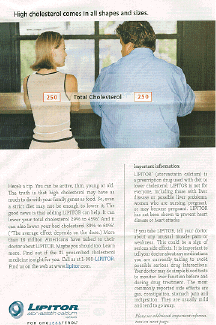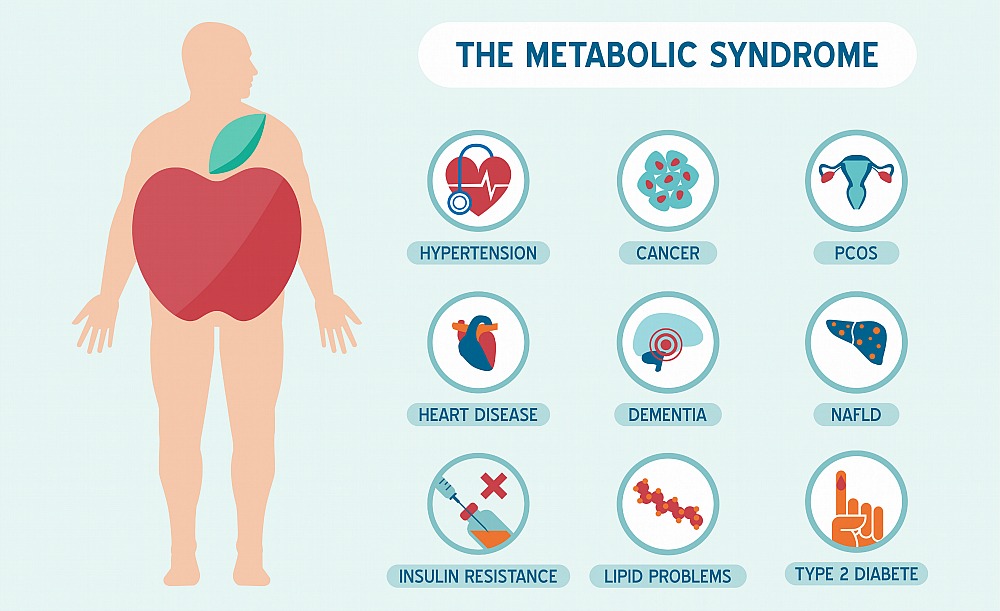Statins have not been shown to prevent heart disease or heart attacks
The more research you do into heart health, the more incredulous you become at what governments support and doctors prescribe to millions. Up to 7 million in the UK, and almost 200 million people in the USA (half of men, ages 65 to 74, and 39% of women, ages 75 and older) are taking Statins to improve heart health. This is shocking considering there is little evidence for most patient groups, and no evidence for women who have never had a heart attack, that Statins provide any positive benefit and in fact it appears that they probably do more harm than good due to muliple known side effects .
While this idea seems not to have reached doctors, you don’t have to look far to reach this conclusion yourself. Even this Lipitor Ad below says in the fine print on the bottom of their ad: “Lipitor has not been shown to prevent heart disease or heart attacks.”

Lipitor Ad clearly stating that Lipitor does not prevent heart disease or heart attacks! I think this will be surprising to most people who are either considering or on Statins. Thanks to the Weston A Price Foundation for posting this advert.
Ditto for another Statin, Crestor, which my dad is currently on.
Barbara H. Robert, M.D., author of The Truth About Statins: Risks and Alternatives to Cholesterol-Lowering Drugs, outlines the problems in this excerpt below from her excellent interview in the Huffington Post by Martha Rosenberg:
- “There is no question that many doctors have swallowed the Kool-Aid. Big Pharma has consistently exaggerated the benefits of statins and some physicians used scare tactics so that patients are afraid that if they go off the statins, they will have a heart attack immediately. Yet high cholesterol, which the statins address, is a relatively weak risk factor for developing atherosclerosis.”
Lipitor is a statin that had a 17% market share in the Statin marketplace as of Sept 2011. Statins rake in billions each year yet surprisingly, they appear not to work.
Why do we keep prescribing something that doesn’t really work?
Roberts explains that “you have to remember that medical journals depend upon Big Pharma for their ads and reprint orders just as medical centers and medical professionals rely on Big Pharma for funding. It is a round robin situation that probably won’t change until the patients, doctors and the public demand change.”
To me, it seems like a basic error in logic.
- Atherosclerosis is to be avoided
- Higher levels of cholesterol in the body have been linked to atherosclerosis
- Therefore, we should take a cholesterol lowering statin drug
Wait a minute here! Instead of immediately being put on a Statin drug, what if we take a step back and ask a few more questions?
- What else causes atherosclerosis?
- Does lowering cholesterol alone stop it?
- Also – where did the high cholesterol come from in the first place?
- Is there something that you are doing habitually, that is causing the increased levels of cholesterol?
- You’ve got to say ‘how did I get here? What are the reasons for my high cholesterol in the first place? Is cholesterol an inevitable part of ageing, or is it something that I have some control over?’
This is exactly what I did when I was originally diagnosed with Familial hypercholesterolemia last September. I was told immediately by 3 different doctors that I had to get onto Statins immediately and that lifestyle and diet would not work to bring my extreme cholesterol back under control. I remember coming back from my doctor’s appointment, sitting at my desk in the office feeling panicked and like I was going to have a heart attack any minute. It felt like I’d better decide at lightning speed what I was going to do to get this cholesterol under control.
I really was not sure what to do at first. I didn’t find the information gathering process that easy. There is a lot of conflicting advice. So I decided to see what I could do on my own, and then if it was indeed impossible, that I would consider a drug based treatment.
I think that first blood test that you get back from the doctor telling you that your levels are high, is telling you that something is wrong. It’s saying that how we are managing and feeding our body is producing bad consequences. It seems to me that instead of heeding this wake up call, and making lifestyle changes to heal our bodies, we are being told to mask the symptoms of poor health (elevated cholesterol levels), and instead of taking steps to heal our bodies, we take a drug that “makes it all go away”.
Of course, it doesn’t just go away. This band aid approach ignores the fact that cholesterol is only 1 indicator of heart health.
We get a false sense of reassurance that we are now “healthy” when in fact all we’ve done is hide the warning signal of high cholesterol, because drugs are now unnaturally lowering our cholesterol levels. So we feel better. We have “good blood test results”.
But if we haven’t changed what we are ingesting, or our activity levels, we are very likely just continuing to build up unhealthy substances in our system, that contribute to heart problems down the road.
I don’t believe there is a magic shortcut to health in the form of a pill. It seems very reasonable to me that if you ingest Broccoli vs. Bacon, regardless of whether you are on a pill or not, you are healing your body. If you exercise vs. maintain a sedentary lifestyle, you are supporting a healthier future you. If you were doing these things habitually, you wouldn’t need a cholesterol drug.
So I suggest that instead of knee jerk prescribing, we need to stop for a minute and ask “Where did my high cholesterol come from in the first place? What is this telling me?”
With the right knowledge, there are thousands of studies that support the idea that you can change your cholesterol levels with diet and exercise in a relatively short period of time. Dr. Dean Ornish has been studying lifestyle based approaches to heart disease prevention and reversal for more than 34 years. Ornish says that “heart disease is completely preventable–today–in at least 95 percent of people simply by changing our diet and lifestyle, and with medications when indicated. We don’t need a new drug or breakthrough technology; we simply need to put into practice what we already know.”
Habits are powerful. If we simply swapped the habit of popping a pill, vs. the habits of healthy eating and moving, the vast majority of us would be healthier and live longer.










Excellent article, right up to the point of disparaging bacon and “misquoting” Dr. Ornish. I can’t argue with the, “heart disease in 95% of people could be eliminated by diet and lifestyle,” but Dr. Ornish’s diet and lifestyle changes are diametrically opposed to what works i.e., a high fat, low carb diet. Even Bill Clinton has discarded the low carb starvation diet preferred by Dr. Ornish and has gotten on to the high fat diet.
I think that the problem might lie in that people typically take the path of least resistance. If those people can take a pill and mistakenly think they are doing something right (it takes about 15 seconds of the day to find the pill bottle and take the statin) instead of spending the rest of the day making good decisions about their health (not overeating, taking the stairs, walking to the mailbox, etc.) they are actively engaged in living the path of least resistance.
So true Allen – it’s a false equivalency, isn’t it! It seems like pills might be curing you of your ailment instead of masking the underlying condition. Of course, if all things were equal and we simply had to choose between pills and lifestyle, then yes, pills would win, because they are way easier! But of course they come along with devastating side effects, and they don’t actually tackle the original problem. So we continue to degrade our bodies while adding to our burden by adding side effects! Insanity!